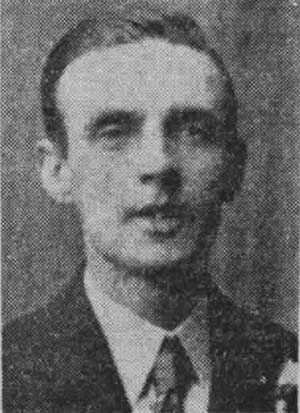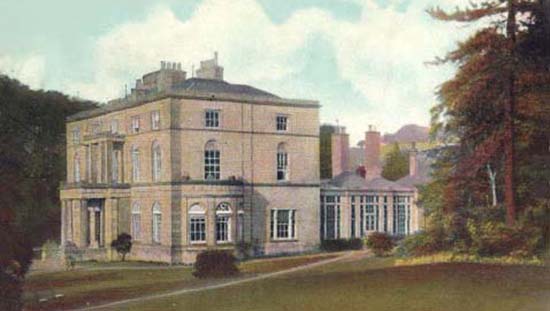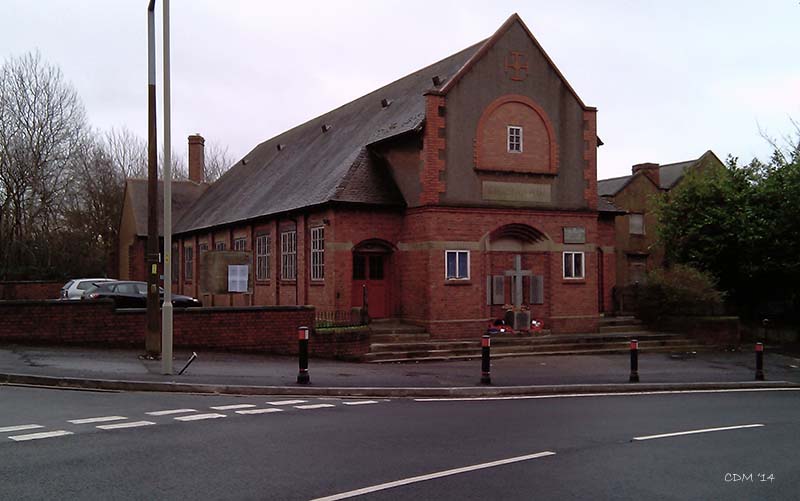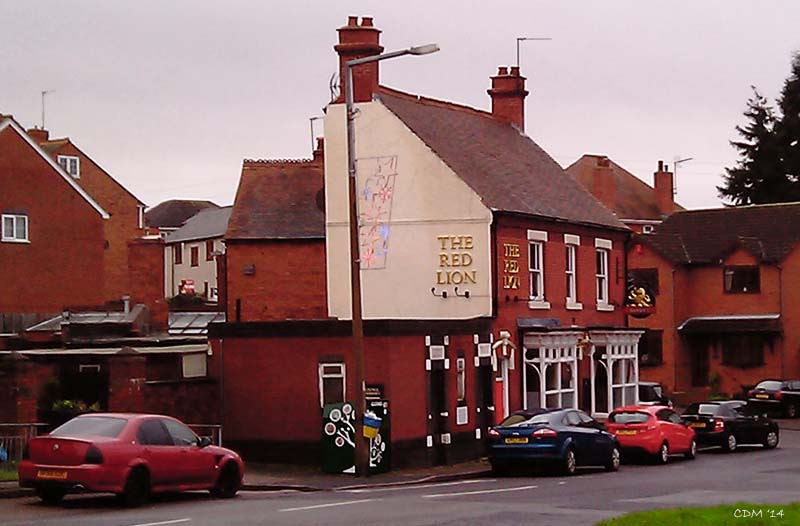
|

|
|
|
Landmarks ~
Churches ~
Pubs ~
Shops ~
Amenities ~
Dwellings ~
Events ~
Schools ~
Sports
Industrial ~ Transport ~ Families
~ Gallery - Amenities ~
Cinema
1931: The Cinema Fire at The Alexandra Picture House, Lower Gornal .
 The remains of the Picture House in 1931.
The remains of the Picture House in 1931.
 Francis (Frank) Harold Danks of Shutt End, Pensnett, victim of the cinema fire.
Francis (Frank) Harold Danks of Shutt End, Pensnett, victim of the cinema fire.
A mysterious fire destroyed the cinema in 1931, and Frank Danks, the film operator,
died from burns he received in the blaze.
How the blaze started was a mystery and was never solved.
The event was widely reported in the press.
In the picture, the poster boards had survived the blaze, note the films showing at the time:-
'Redskin' - a 1929 silent film starring Richard Dix. 'House In The Sun', 1929 French silent film, starring France Dhélia
The following account was taken from the inquest into the death of Francis Danks
as reported in it's entirety in the Dudley Chronical of Thursday 10 September, 1931.
GORNAL CINEMA FIREINQUEST ON A PENSNETT VICTIM OF THE OUTBREAKThe Cause Still a Mystery.The mystery surrounding the outbreak of the fire at the Alexandra Picture House, Redhall Road, Lower Gornal, on Thursday August 27th, in which the film operator, Francis Harold Danks, aged 37, of 3, Shut End, Pensnett, was badly burned and died later at the Guest Hospital, Dudley, was not was not cleared up at the inquest upon Danks, which was held by the Deputy Coroner for Dudley (Mr. F. W. Green) in the Dudley coroner''s Court on Monday of last week.Evidence was given by nine witnesses, but at the conclusion Mr. Green announced that the cause of the fire was still unexplained. Mr. MacGregor Clarkson represented the Alexandra Halls Midlands, Ltd., the owners of the hall, and Mr. J. T. Higgs appeared for the relatives of the deceased. Police Superintendent F. W. Orland represented the Bilston police. Herbert Brown, of 3. Shut End, Pensnett, identified the body of the deceased as that of his brother-in-law, with whom he lived. Witness last saw him alive in the Dudley Guest Hospital, and although he was conscious he did not make any statement concerning the fire. Witness had seen him the previous night, when he appeared to be in his usual spirits. He had always seemed happy at his work. Danks had been a non-smoker for many years. The father, William Danks, of 3. Shut End, Pensnett, said that his son had been employed at the Picture House for about 15 years. He last saw him alive at about 4.30 pm., on Thursday, when he left home to go to his work. He usually went at about 3.30 p.m., but the fact that his mother was ill made him a little later on that occasion. He did not smoke, but as a rule he carried matches. Witness added that he believed he used them in connection with the lighting of the cinema, although he was not sure. Mr. Higgs: It is compulsory for a picture house to have gas jets alight during the show? -Yes. And in the course of his duties preparing for the show your son would have to light these gas jets? -Yes. CHANGE OF FILMS. Ernest Arthur Grenville Jones, electrical engineer and director of the Picture House, said that he arrived at the house at about five o'clock on Thursday, having been at Coventry during the day. Danks arrived at about 5.30 p.m., and said that he was sorry he was late, but that his mother had had a bad turn. A man named Davenhall had been at the house during the day working on the installation of a talking pictures apparatus. When Danks arrived he had got to prepare an entire change of programme for the evening performance, which meant that all the films would have to be rewound and placed in their proper order. The films were taken out of steel boxes and then run onto the spools by hand. This work was done by Danks in the rewinding room, which was a separate room entirely from the operating box. These rooms were reached by wooden and steel staircase, the latter having been installed following a suggestion from the inspector in case of emergency. At about six o'clock that night he and Davenhall were working in the operating room, while Danks was engaged upon preparing the films for the evening performance in the winding room. In the course of their work Davenhall had to go out of the operating room to fetch a drill, and when he got outside witness heard him shout, "There is a film on fire!" Witness got a fire extinguisher, ran out and gave it to Davenhall, and then went back to get another extinguisher. They played it on the flames, which were coming from a roll of film which was alight on the floor. The film was perfectly coiled, and appeared as if it had been placed there rather than dropped. Danks was on the other side of the flames, but was only about three feet away. Witness and Davenhall yelled at him to come out, but be didn't speak a word. Danks he added, could have got out had he come when they shouted to him. TERRIBLE FUMES. " By this time," continued Witness, "the fumes were so terrible that we had to beat a retreat through the door. The door admitting to these premises was of wood, but that to the operating room was fire-proof. The former was a good distance from the place where the rewinding was done. He did not think the wood was touched by the fire. The Coroner: It should have been fireproof. should it not? -It was never suggested to us. It should have been made of fire-resisting material, should it not? -It was not. Was there any ventilation in this place? -The two front windows had two sliding parts. Were they open? -Oh, yes. What fire appliances had you got? -Upstairs there were two fire extinguishers, a bucket of water, a bucket of sand and a large asbestos sheet. Did you use the asbestos sheet? -No. We used the fire extinguishers, as they seemed the best things to use. Witness added that when he rushed out of the room he shouted to Danks to follow him. He then went down into the body of the cinema and got two more fire extinguishers, one for himself and one for Davenhall. He went back to the winding room and played the extinguisher upon the flames, but without any success. He managed to reach the window, which he smashed, at the same time shouting for help. He then got hold of the film box, and handed it to Davenhall, shouting to him to get out. He did this because he thought it might contain some more films which would catch alight. The Coroner: What was Danks doing all this time? -I don''t know. The fumes were so dense that I could not see anything at all. I got on my hands and knees and felt about the floor for him. My face was scorched and I could scarcely breathe. I got hold of Danks and dragged him to the landing to the steps. I was overcome and I fell down. There was no light in the rewinding room, he added, but they had an electric light in the operating room because there were no windows in it. There were no gaslights in the cinema, although Danks would require matches for the oil engine that worked the generating system. He (witness) was a non-smoker. Previously someone had asked him for a match, but he had not got one, neither had Davenhall. MUST HAVE HAD A MATCH. The Coroner: Can you in any way account for the cause of this fire? -No, I can only assume that he must have had a match. It appears as though he had left the re-winder and gone across the room for something. It was perfectly light where he was? -He might have struck a match for something. He might have trodden on one. I cannot imagine why he did not come out of the building, because he had plenty of time. Danks he added, had been with him for 12 years, and was a teetotaller and non-smoker. He agreed that he might have been in a hurry that night, particularly in view of the fact that his mother was ill. Replying to Mr. Higgs, witness said that as far as be knew. Danks, Daverhall and himself were the only persons in the building at the time of the outbreak. He and Daverhall were working on the talking picture apparatus which was being installed. Their work would not interfere with the electric circuit and they had not bared any live wires. The outbreak could not have been by anything they were doing in operating room. Replying to questions as to why Danks did not leave the room when he shouted, witness agreed that it was probably because be was trying to extinguish the flames. Mr. Higgs: He might have also been overcome by the fumes at the time? -Yes. A probable reason also was because he was anxious to save the property? -Yes. Witness added that in view of Danks' war injuries the fumes would probably overcome him quicker than they would an ordinary man. There was no conceivable reason why he should want a light? -No. Mr. Higgs: The only observation I wish to make is that in the circumstances the construction of this place was very difficult for exit, but it satisfied everybody and passed inspection. Still, the only way down was practically a perpendicular ladder? -I don't think it affected Danks getting out. But it was the only way of escape? -I don't think it affected his getting out. I went over the ground twice. Answering Mr. Clarkson, witness said that most staircases he had seen in Picture houses were of similar nature. Similar evidence was given by Ewart John Davenhall Davenhall, electrician, of 36. Broadway, Codsall, who said that when he went into the rewinding room Danks was standing at the back of the film. He (witness) and Mr. Jones kept shouting to him to come through. Jones eventually dragged him to the door of the operating box, and witness took him to the top of the stairs. He was then taken down by some other men. Witness did not see any light in the cinema except the one they had got on in the operating box. Witness remembered being asked for a match, he thought it was Mr. Jones who had asked him. He had not got one. He had a petrol lighter in his pocket, but it was empty. He added that the door at the top of the wooden steps opened inwards. "UNSATISFACTORY ARRANGEMENT." The Coroner: It is easy get in, but difficult to get out. One would have thought it would have been the other way about. A very unsatisfactory arrangement in case of fire, is It not? -It sounds peculiar now you come to think about it. He added that the interior of the rewinding room was of corrugated iron nailed to wooden supports. Lawson Hobson, aged 12, of 54, Redhall Road, Lower Gornal, an errand boy employed at the cinema, said that at about six o'clock he went upstairs into the rewinding room and saw Danks winding films. " I asked Frank for a match, as I had got to take some rubbish outside and burn it," continued witness. "He gave me a box, and told me not to go striking them all. I went and burnt the rubbish, but on coming back I opened the door and saw the smoke and flames. I then ran back." Cross-examined by Mr. Higgs, witness said, he was certain that no match fell out of the box when he handed them to him. He did not open the box, and did not know whether Danks had another box in his pocket. George Ball, of 7. West Street, Lower Gornal described how upon seeing smoke and flames issuing from the building, he got a ladder and climbed up to try and get through the window. " I smashed the window but the fumes were so dense that I could not get through." he continued. " I got down, and two minutes after Mr. Jones came to the window and shouted fetch help." Witness added that he rushed to the entrance and met Mr. Jones, who said, " I am beat go and see if you can get him." Witness climbed on the stairs and found Danks lying at the top with his clothes burnt and saturated with water. Together they tumbled down the stairs. Graphic descriptions of how they assisted in getting Danks out of the building were also given by James Edward Wakelam, of 52, Redhall Road, and Tomi Power, of 7a, Redhall Road. "LORD HELP ME!" Wakelam said that when Danks was lying outside the house he heard him say " Lord help me.!" He tried to say something else, but could not do so. P. C. Morris, of the Dudley force, said that Danks made no statement in the ambulance on the way to the Dudley Guest Hospital. James Patrick, house surgeon at the Guest Hospital, stated that deceased was admitted to the institution at about 6.50 p.m., suffering from extensive burns. Witness did what he could for him, but he died at 9.20 p.m. The cause of death was shock, following the burns he sustained. He was quite conscious during the time he was in hospital, but did not make any statement. The Coroner said that the medical evidence left no doubt as to the cause of the man's death. Neither matches or supposed naked wires entered into the causes of the man's death, but one thing did emerge, and that was the difficult position in which the man found himself. " I am satisfied." continued the Coroner. "that it was not a proper room for the purpose. It did not seem to have proper ventilation, and was entirely open to other rooms. Whether that is in accordance with the regulations it is not for me to say, except that, it seems to me a difficult position. Here was a man in a passageway, with little ventilation. The door to get out opened inwards and was followed by an awkward stairway. By some means or other the film became ignited, and in consequence the man met with his death. How the fire commenced remains a mystery which none of us can apparently clear up." Mr. Higgs, on behalf of the relatives, said he wished to thank all those who had attempted to save Danks. Their efforts were much appreciated. Mr. Clarkson, on behalf of the owners of the cinema, expressed sympathy with the relatives of the deceased. -----------------~
|
||



 Memorial Hall
Memorial Hall Schools
Schools Pubs
Pubs